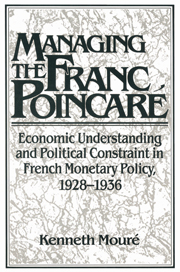 Managing the Franc Poincaré
Managing the Franc Poincaré Book contents
- Frontmatter
- Contents
- List of figures and tables
- Acknowledgments
- Abbreviations used in the notes
- Introduction
- 1 The depression in France
- 2 French gold accumulation, 1928–1932
- 3 The World Economic Conference and the gold bloc
- 4 The Bank of France: market control and interest-rate policy
- 5 The Treasury and government finance
- 6 The devaluation debate
- 7 Devaluation of the franc
- Conclusion
- Appendix
- Bibliography
- Index
Introduction
Published online by Cambridge University Press: 23 November 2009
- Frontmatter
- Contents
- List of figures and tables
- Acknowledgments
- Abbreviations used in the notes
- Introduction
- 1 The depression in France
- 2 French gold accumulation, 1928–1932
- 3 The World Economic Conference and the gold bloc
- 4 The Bank of France: market control and interest-rate policy
- 5 The Treasury and government finance
- 6 The devaluation debate
- 7 Devaluation of the franc
- Conclusion
- Appendix
- Bibliography
- Index
Summary
No one contends that France experienced a revolution in economic policy during the Great Depression. Other industrialized countries, struck by massive unemployment, the collapse of industrial production, plummeting prices, and financial contraction, responded with various degrees of innovation to the problems of the 1930s – the New Deal in Roosevelt's America and the Nazi economic recovery in Germany are the most striking examples. In France, all novelty and experimentation were rejected in the conviction that a durable recovery could be achieved only by a return to strict economic orthodoxy. Classical economics had not failed its human subjects; policy makers had failed to adhere to its teachings, and their attempts to improve on the operation of an unfettered market system were in large part responsible for the economic ills that afflicted the world economy.
Close examination of policy making in the 1930s has dispelled the notion that the economic crisis engendered revolutions in economic policy. In Britain, where the publication of John Maynard Keynes's The General Theory of Employment, Interest and Money in 1936 revolutionized economic theory, the evolution of Treasury policy was less spectacular. The Treasury was beginning to accept a government role in economic management in order to reduce unemployment and maintain reasonable price stability, but this was not, in the 1930s, a “Keynesian revolution” in policy making. Recent studies of the Nazi economic recovery call attention to the limited nature of the recovery, its traditional character in the early stages, and the role of state controls as an essential counterpart to increased government spending in order to sustain recovery, which would otherwise have been curbed by market forces.
- Type
- Chapter
- Information
- Managing the Franc PoincaréEconomic Understanding and Political Constraint in French Monetary Policy, 1928–1936, pp. 1 - 9Publisher: Cambridge University PressPrint publication year: 1991


